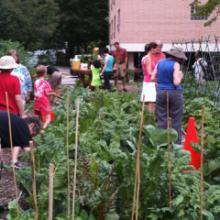food justice

Jason Person / Shutterstock
KARLA VASQUEZ, director of community programs at With Love Market and Café in south Los Angeles, takes a live-and-let-live approach to cooking and nutrition. In classes at the recently opened market—whose mission includes increasing access to affordable fresh food in an underserved area—she encourages people to try new foods. But the bottom line, she told Sojourners: “You don’t like kale? I will never make you eat it.”
Vasquez doesn’t teach a catechism of “healthy vs. unhealthy” foods. A community organizer with culinary training, she instead focuses on giving class participants tools for healthier, but realistic, eating: how to understand nutrition labels and cook those healthy ingredients, so they can have food that will work for them. So in a class on “guilty pleasures” Vasquez discourages the guilt, instead offering ways to gently alter beloved dishes to maximize flavor and make them more nutritious, rather than give them up completely. She calls a class on all-vegetable dishes “cooking the rainbow,” emphasizing the beauty and taste of dishes made vibrant with a variety of produce—because she knows if she used the word “vegan,” many of her students might balk. “They’d say ‘That’s not for us—that’s what hipsters eat!’” she says.
With Love Market (withlovela.com) is a for-profit business that promotes a social bottom line. Along with the food market and classes, there is a café and a community garden. With Love pays its staff an above-average wage and specifically recruits employees from the neighborhood, hoping to help long-time Latino/a and African-American residents stay despite the pressures of gentrification. And it tries to create a space where long-term and newer residents of all backgrounds, plus students from the nearby University of Southern California, feel welcome.
In an attempt to reframe the story of slavery and reclaim food traditions, she has dedicated a section of the garden to re-creating some of the farming techniques and foods that enslaved Africans brought to America.
The Rev. Morris G. Henderson wasn’t sure what do with a vacant city block of land behind his 31st Street Baptist Church in Richmond, Va. The church had purchased the plots, but didn’t have the funding to build a planned family life center.
Then, he had a vision.
“Why not build a garden and people can learn to be self-sufficient and we can grow food?” Henderson said.
With an 80-year-old congregant heading the project, the congregation planted its first garden in 2008: watermelons, tomatoes, okra, squash, strawberries, and blueberries.
By the second year, even after the gardening chief had passed away, congregants were getting guidance from the Virginia Cooperative Extension; this year, the church has at least two dozen raised beds, with the bulk of the harvest used for the church’s Monday-Friday soup kitchen.
The Supreme Court ruled that farmers must pay Monsanto every time they plant the company’s genetically modified soybeans. Indiana farmer Vernon Hugh Bowman argued he was not violating the patent because the soybeans self-replicate. The justices felt "Bowman’s practices threatened the incentive for invention that is at the heart of patent law." Bowman was ordered to pay $85,000 to Monsato. This case could have broader implication on patent protections for vaccines and other products that self-replicate. The Washington Post reports:
If someone is able to copy a patented product simply by planting it and collecting its progeny, “a patent would plummet in value after the first sale of the first item containing the invention,” Justice Elena Kagan wrote. “And that would result in less incentive for innovation than Congress wanted.”
Read more here.
We have reached that point in the year when the images we are inundated with show off variations on a theme: the Norman Rockwell-esque holiday gathering. They are a testament to the ability of advertising to tug on our heartstrings as the large, joyful family sits down to a table lavishly set with the antique china, candles twinkling, and a feast spread as the Christmas meal in all its glory looms and the joy and generosity of the season is palpable.
Here in Florida, the grocery store chain Publix is as ubiquitous to holiday celebrations as pie. Publix has been a part of our Christmas celebrations for generations and yet this year impromptu runs to the family-owned grocer will simply not be an option for the Reverend Clay Thomas, or for those who stand with him.
As it turns out, earlier this year Reverend Thomas was ejected and then banned from a Sarasota, Fla., Publix.
His crime?
He supports the Coalition of Immokalee Workers (CIW).


